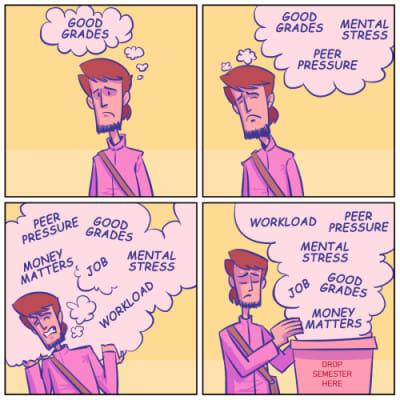Is Dropping a Semester Worth It?

Let's say you're in need of a break because you're having to deal with a lot more than what you can cope with.
However, this break will need to last longer than a day or two. The break you need needs to run the length of an entire semester of your university. The question now is whether or not taking a semester gap is worth it.
We reached out to two undergrad students – Zarin Rayhana (Information Technology, Griffith University, Australia), and Sakib Shadman (School of Business, Independent University, Bangladesh), who have previously dropped a semester each in order to cope with certain things, and asked them to share their thoughts and experience regarding the matter.
What could be the reason for dropping an entire semester?
As mentioned earlier, stress is one of the main reasons you should go on a break. However, it's not necessarily the only reason to make that decision. Zarin took a break due to her lack of motivation from studies which resulted from stress, while Sakib decided to do the same strictly for professional reasons.
"I had recently started a business and I needed some time to bring it into shape," said Sakib. "Another reason I took the break was to get an appointment letter from the place I worked at by giving them 3 months' worth of full-time hours."
Many students have the misfortune of not being able to start the semester due to financial reasons. Hence, they're forced into dropping the semester. This scenario is more common in private universities in comparison to the public ones. Some of these students go on to do different types of jobs so that they can save up money for their next semester.
There are also cases where students find themselves starting the semester a bit too late, and fail to catch up. For instance, if they have to travel away from home or go abroad for a long period of time, such that they end up missing two-three weeks of classes, they'll have to face a lot of difficulties when they try to catch up. Under such circumstances, many of these students would prefer dropping that particular semester instead of risking a bad GPA.
Besides, students have to deal with various other issues, which can take up a lot of their time as well as affect their mental or physical well-being. These cases may include personal problems like the passing away of a loved one, as well as different health problems. Under such circumstances, it is natural to assume that they will not be in a state to bear the burdens of the semester ahead.
Everyone will have their own reasons for dropping the semester. It's a huge decision to make that comes with its own benefits as well as repercussions. Hence, do a thorough risk assessment before you go ahead with the drop.
Explain the situation to your parents or guardians, and ask them for their input into the matter as well. Given how they might tend to be sceptical of the idea or oblivious to your problems, you should make sure that you are presenting your case backed with proper justification, as well as the expected consequences of carrying on with the semester anyways. Consult with your on-campus counsellor if you need to for this purpose.
What can I do during the break?
Given that your break will last the entire semester, it can be assumed that you'll be spending a total of 4-6 months away from day to day academic activities. Hence, you can spend the time doing what you like. If you want to be productive, you can try working on your existing skills or go ahead and learn something completely new. If necessary, enrol yourself in different online and offline courses. You could even get a part-time job.
"Dropping a semester helped me find new hobbies that I otherwise wouldn't have time for, like painting and photography," says Zarin. "At the same time, it allowed me to revisit my old ones, such as reading and writing. I even got a part-time job that not only helped me save up for my wish list and a small vacation, but also reinforced my resume."
In case you just want to give time to yourself, you should spend time doing the things you think will help you relieve your stress. Give yourself the time to rethink some of your decisions as well as plan new ones, something Sakib did that eventually helped him with his professional life. "I got some alone time to relax and figure out what I wanted, which direction I wanted to go towards, and plan my next moves accordingly," says Sakib. "It helped me with work, sort out my personal affairs, and even get a promotion. I also got composure, and am not in contempt with life."
What are the drawbacks of dropping a semester?
The primary drawback of dropping a semester is the constant feeling that you're going to fall behind in your academics. But even this is an abstract thought that'll in no way affect you if you don't let it. "The only drawback I found is the small nagging at the back of your head that you're falling behind," says Zarin. "However, the fact that you get to learn things outside of academics and get new perspectives on life overshadows the anxiety of falling behind."
There is also the concern that dropping a semester will cause a delay in graduation. Many students are afraid about the fact that if they can't complete all the credits required for their graduation in due time, it will hamper their flow or future plans of enrolling in a post-graduation program, getting into a job, or leaving for abroad—which is true. As you take a semester gap, you're forced to push back your graduation. To add to that, there is also the societal pressure to get done with your university so that you can move on to do the other important things in life.
Besides that, you may be stripped of your scholarship or any other academic privilege you're enjoying if you take such a semester gap, depending on your university policies. If such policies are in place at your institution, it's recommended that you try and avoid such a gap, or present your problems to the respective authorities and ask them to make an exception for your case.
What is the end result?
At the end of the day, dropping an entire semester to recollect your composure or work on your professional skills is not a bad idea. In fact, it's a trade-off that can only work in your favour, IF you can make the most of it.
"After taking a semester off, I went back to university with way more vigour to do better in studies because of my renewed happy energy and changed perspectives," added Zarin. "The key is to utilise the time properly, either by learning or just focusing on yourself. Otherwise, you might regret dropping the semester in the first place."
Taking a semester gap may not be the only way to deal with whatever circumstances you're having to go through. However, at times, it may be the most reasonable way to deal with them. If you are in a situation where dropping the semester is the only viable option and you have the privilege to do so without having to face any adverse consequences, you should consider taking the gap.
Faisal wants to be the very best, like no one ever was. To survive university is his real test, to graduate is his cause. Send him memes and motivation at [email protected]

 For all latest news, follow The Daily Star's Google News channel.
For all latest news, follow The Daily Star's Google News channel. 








Comments